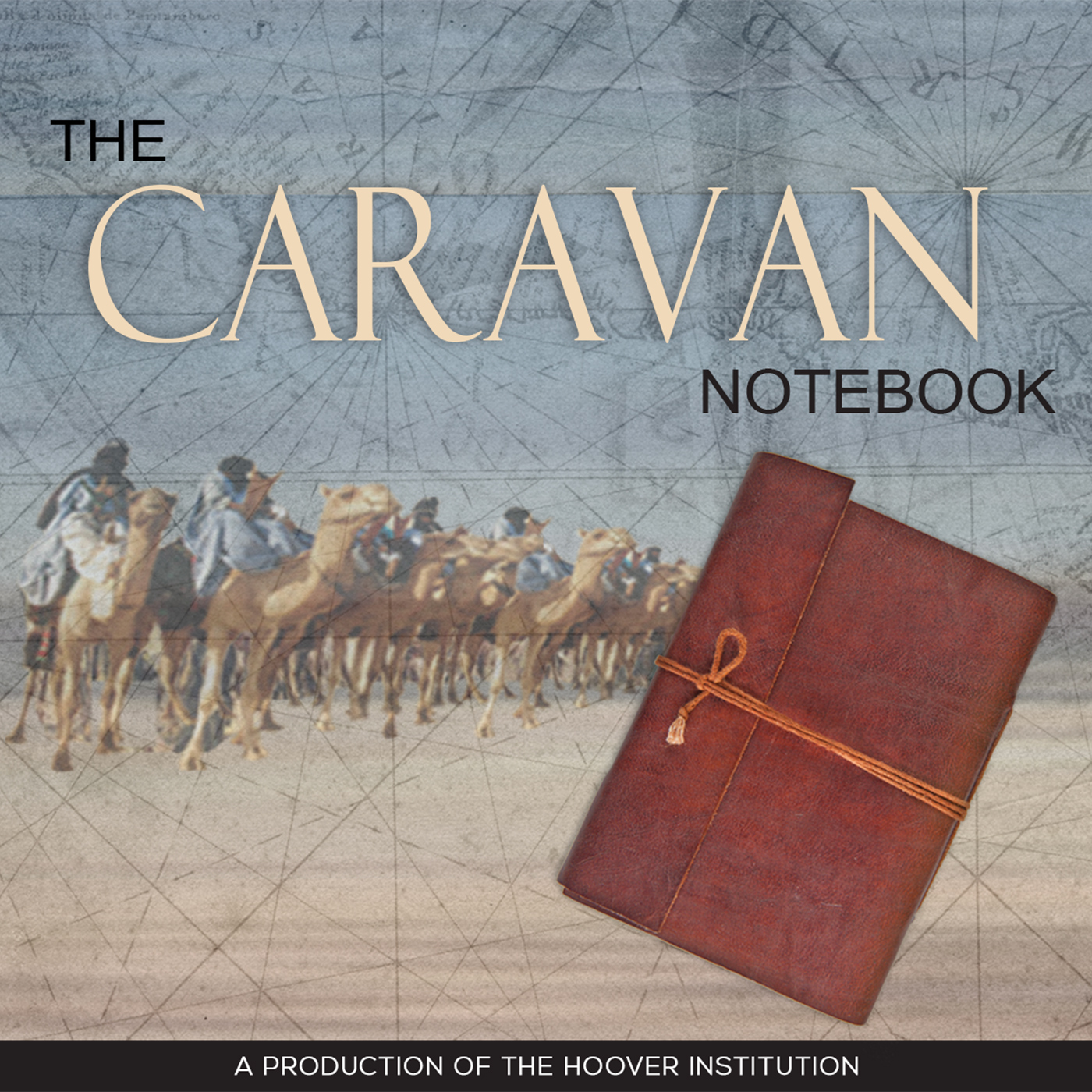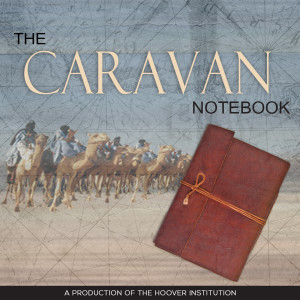
27.8K
Downloads
30
Episodes
The Caravan Podcast provides discussions of politics and culture in the Middle East and the Islamic World with regard to the challenges for American foreign policy.
The Caravan Podcast provides discussions of politics and culture in the Middle East and the Islamic World with regard to the challenges for American foreign policy.
Episodes

Monday Oct 04, 2021
Yemen, al-Qaida, and the Jihadi Threat
Monday Oct 04, 2021
Monday Oct 04, 2021
Elisabeth Kendall, a scholar of Arabic and jihadism at Oxford University, joins the podcast to discuss the state of the jihadi threat in Yemen, a country she knows well. The local franchises of al-Qaida and the Islamic State are weakened but continue to pose a significant threat. As Kendall argues, conditions in Yemen favor an al-Qaida resurgence. How have these groups changed over time and where are they headed? How do the jihadis fit on the political map of the ongoing Yemeni civil war? Would a ceasefire in the war diminish the jihadi threat or, perversely, fuel it?

Friday Sep 10, 2021
The Syrian Crisis: A Focus on Daraa, ‘Cradle of the Revolution‘
Friday Sep 10, 2021
Friday Sep 10, 2021
Colonel (Ret.) Joel Rayburn knows the Middle East well. He served as Deputy Assistant Secretary for Levant Affairs and Special Envoy for Syria during the Trump administration, after tours of duty in Iraq and Afghanistan. He is also an accomplished historian, author of Iraq After America: Strongmen, Sectarians, Resistance (Hoover Press) and co-author of the Army War College history of the Iraq War. This conversation begins with an analysis of the situation in Daraa, a city in southern Syria where the revolution against the Assad regime began in 2011. Russia-brokered agreements between the rebels and the regime in 2018 and 2020 have broken down, as Assad tries to establish full control and extend its longstanding strategy of forcible displacements, that is, forcing restive population groups to leave, adding to the international flow of refugees: this is a war crime. Col. Rayburn discusses the developments in Daraa in detail and then places them in the framework of the ambitions of the various international actors: Russia, Iran, Turkey, the United States, Israel and the Europeans. He concludes with brief remarks on the prospects for the recently announced formation of a government in Lebanon.

Wednesday Aug 25, 2021
The Return of the Islamic Emirate of Afghanistan: A Conversation with Asfandyar Mir
Wednesday Aug 25, 2021
Wednesday Aug 25, 2021
Asfandyar Mir, a noted expert on South Asia and terrorism, was in Kabul just weeks before the Taliban overran the country in mid-August. How did the Afghan government fall so fast and what will be the ramifications of the return of the Islamic Emirate of Afghanistan, the official name of the Taliban? Has the group changed since it last governed the country between 1996 and 2001? What is the nature of the relationship between the Taliban and al-Qaida? Can the Taliban really be trusted to prevent Afghanistan from being used to threaten the United States?

Tuesday Aug 10, 2021
Lebanon: Between Economic Crisis and Sectarian Conflict
Tuesday Aug 10, 2021
Tuesday Aug 10, 2021
Paul Wood served as BBC foreign correspondent for twenty-five years and is now a columnist for the The Spectator magazine in London. He has reported from a wide range of locations across the broad Middle East: Afghanistan, Croatia, Bosnia, Macedonia, Chechnya, Libya, Algeria, and Sudan including Darfur. He covered the invasion of Iraq from Baghdad in 2003 and the fighting in the Syrian Civil War from Homs in 2012. He is also a keen observer of the complex situation that has been developing in Lebanon. In the background is the severe economic crisis, in which the currency has lost some 90% of its value, pushing much of the population below the poverty line. The government is drawing down the remaining foreign currency reserves to continue to subsidize some basic commodities, but the political leadership has proven unwilling to undertake the sorts of reforms on which support from the IMF is conditioned. The structure of political power also contributes to an ongoing stalemate, despite the severity of the crisis. The key political blocks are defined in sectarian terms--Sunni, Shia, Druze, and Christian--designed to deliver patronage to their respective clientele. The key actor however is Hezbollah, internationally regarded as a terrorist organization. It plays multiple roles: a social service organization for poor Shia, a proxy for the Iranian regime, a participant in international criminal activities, especially the drug trade, and its self-declared mission to mount the "resistance" to Israel. Recent events testify to growing popular opposition to Hezbollah inside Lebanon, as Lebanon faces further loss of governability, economic implosion, or renewed conflict involving Hezbollah, acting for Iran, and Israel.

Thursday Aug 05, 2021
Yemen and the Houthis: A Conversation with Bernard Haykel
Thursday Aug 05, 2021
Thursday Aug 05, 2021
In September 2014, the Houthis, a revolutionary Islamist movement, seized control of the Yemeni capital of Sanaa, precipitating a civil war in the country that continues to this day. Who are the main actors in the Yemen conflict? What is the role of the United States? What do the Houthis really want? Professor Bernard Haykel of Princeton University, a noted expert on Yemen, addresses these questions and more, including potential avenues for resolving the unending conflict.

Wednesday Jul 21, 2021
Mohammed Bin Salman and Saudi Arabia
Wednesday Jul 21, 2021
Wednesday Jul 21, 2021
Ben Hubbard is the New York Times bureau chief in Beirut, Lebanon, and author of MBS: The Rise to Power of Mohammed Bin Salman (2020), a biography of the Crown Prince of Saudi Arabia. The conversation treats the Crown Prince's rise to power in the context of a Saudi Arabia marked by deeply conservative cultural formations and at the same time a very young population well connected to modern social media and the cultural products of the West. MBS has promoted reforms in Saudi society, not only by trying to move the economy away from its dependency on oil, but also through some dramatic cultural changes, especially by limiting the role of the religious police, by expanding women's rights and by developing access to forms of previously excluded popular entertainment (cinema, music). Yet these changes are taking place in the context of an absolute monarchy, and the reforms have been carried out with authoritarian power. This tension between liberalization and monarchical power characterizes the current moment in Saudi Arabia; the limits to reform are especially evident in the constraints on public criticism and freedom of the press, as became brutally clear in the case of the assassinated journalist, Jamal Kashoggi. The discussion also addresses the 2017 incident involving the Prime Minister of Lebanon, Saad Hariri, as an example of MBS's political inclinations but also in light of Hariri's recent 2021 stepping back from forming a government in Beirut.

Wednesday Jun 16, 2021
Meeting Abu Muhammad al-Jawlani: A Conversation with Martin Smith
Wednesday Jun 16, 2021
Wednesday Jun 16, 2021
In February, Martin Smith traveled to Idlib, Syria, where he became the first Western journalist to conduct an interview with Abu Muhammad al-Jawlani, a U.S.-designated terrorist and the leader of the jihadi group Hay’at Tahrir al-Sham (HTS). Once an official branch of al-Qaida under a different name, HTS controls Syria’s northwestern Idlib Province, where it has set up a government to manage the affairs of the province’s more than 3 million people. Jawlani has distanced himself from al-Qaida and seeks to improve his image in the West, but his terrorist pedigree has proven an obstacle. Will the U.S. ever lift the terrorist designations? Has Jawlani really changed? What’s it like to interview one of the major jihadi personalities of the past decade?

Wednesday Jun 02, 2021
Israel's Grand Strategy
Wednesday Jun 02, 2021
Wednesday Jun 02, 2021
Facing neighbors fundamentally hostile to its existence, Israel has developed a multidimensional grand strategy. Assaf Orion initially described the development of this strategy in a Hoover essay here and he expands on the topic in this podcast conversation. He begins with comments on the recent conflict between Israel and Hamas, which rules the Gaza strip, as well as the various military and political goals and prospects for the future. The conflict has impacted the political dynamic on the Palestinian side between Hamas and Fatah as well as the process of forming a new governing coalition in Israel. In general, he describes how Israel's defense depends on the strength of its technology sector and the relationship to the educational system although he identifies significant weak spots. Assaf also addresses the changing character of warfare, the existential threat that Iranian nuclear power would present to Israel as well as the danger of nuclear proliferation in the region because other countries would feel compelled to match Iranian nuclear capacity. Finding responsible Palestinian partners for peace is vital for Israel, and it requires curtailing the malign influence of Iran as well as Islamist radicals, both committed to the destruction of Israel. In this context, the Abraham Accords have significantly changed the landscape of the region and provide opportunities for the future.

Tuesday May 18, 2021
Iran’s Last Shah: A Conversation with Ray Takeyh
Tuesday May 18, 2021
Tuesday May 18, 2021
Muhammad Reza Shah reigned from 1941 to 1979, when the Iranian Revolution ushered in the era of the Islamic Republic. In his book The Last Shah, Ray Takeyh chronicles the period of last shah’s reign with a view to understanding the causes of the revolution. What role did the United States play in the coup of 1953? How much responsibility does the shah bear for what happened in 1979? Did Jimmy Carter “lose” Iran? Is the Islamic Republic poised to suffer the same fate as the man it replaced?

Tuesday May 04, 2021
The Competition Between Saudi Arabia and Iran Since 1979
Tuesday May 04, 2021
Tuesday May 04, 2021
Prior to 1979, Saudi Arabia and Iran, two Muslim monarchies--one Sunni and one Shia--were allied with the US in the Cold War against Communism. The Iranian Revolution changed that, as did the Saudi response to the seizure of the Grand Mosque in Mecca. The two powers began to compete for regional primacy, especially through the export of their versions of politicized Islam. Kim Ghattas discusses her book Black Wave, which describes the consequences for the Middle East. This Saudi-Iranian conflict largely plays out in other countries--Egypt, Lebanon, Iraq, Yemen, and Pakistan--often with violent consequences. As religious extremism spread after 1979, a massive rollback in women's rights took place. While today Saudi Arabia and Iran are still locked in competition with each other, religion is losing its grip on a younger generation, that includes activists and writers trying to change repressive systems from within. The diplomacy around the JCPOA negotiations currently under way in Vienna and the policies of the US are of course important, but the future of the region ultimately depends on the agency of local forces hoping to escape the conflict of the past four decades.
